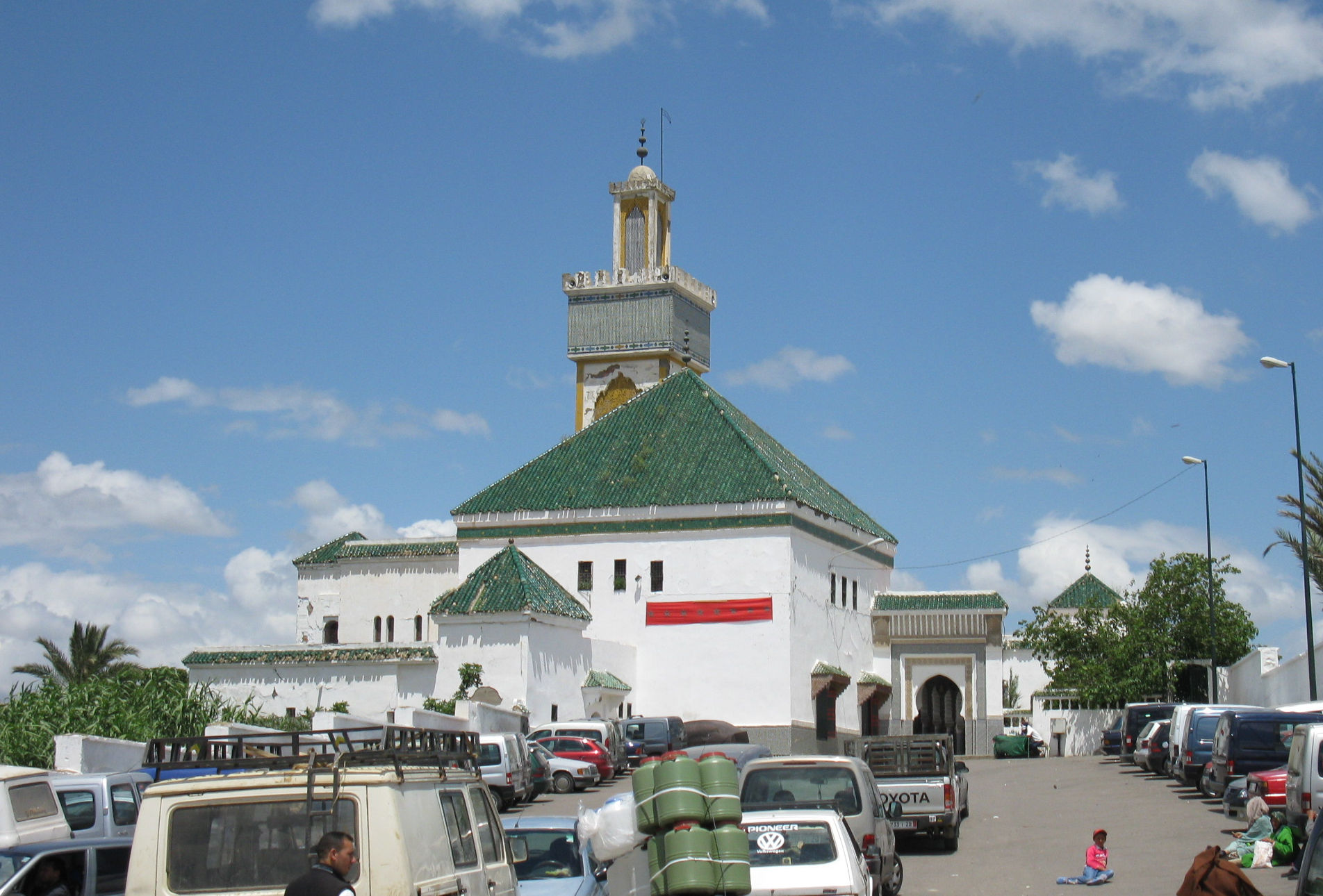|
Mohammed Al-Hadi Ben Issa
Muḥammad al-Hādī ibn ʿĪsā al-Ṣufyānī al-Mukhtārī (; 1467–1526) also known by his title al-Shaykh al-Kāmil () was a Moroccan scholar of Sufism and also an ascetic. He was the founder of the Isawiyya Sufi order. Biography Mohammed al-Hadi ben Issa was a distant descendant of Idris I of Morocco, and he came from the tribe of Awlad Abi Sebaa. He spent most of his childhood as an orphan; his father and brothers fought against the Portuguese but were killed by their commander, Afonso V of Portugal. In his teenage years, he was initiated into the Sufi order of Muhammad al-Jazuli, and lived on to succeed him in such matters. He was a very patient and calm person as he grew older, with more reliance on his god. He became a popularity amongst the people around him, and he took advantage of this to start his own Sufi order, the Isawiyya. Mohammed al-Hadi ben Issa died in 1526, and he was buried in Meknes, where a shrine was established over his grave.an-Noor al-Shameel b ... [...More Info...] [...Related Items...] OR: [Wikipedia] [Google] [Baidu] |
Safi, Morocco
Safi () is a city in western Morocco on the Atlantic Ocean. It is the capital of Asfi Province. It recorded a population of 308,508 in the 2014 Moroccan census. The city was occupied by the Portuguese Empire from 1488 to 1541, was the center of Morocco's weaving industry, and became a ''fortaleza'' of the Portuguese Crown in 1508. Safi is the main fishing port for the country's sardine industry, and also exports phosphates, textiles and ceramics. During the Second World War, Safi was the site of Operation Blackstone, one of the landing sites for Operation Torch. Etymology 11th-century geographer Muhammad al-Idrisi gave an explanation to the origin the name "Asafi" as he linked it to the Arabic word "Asaf" (regret); Asafi (my regret). He based this claim on a strange story about some sailors from al-Andalus who sailed to discover the other end of the Atlantic Ocean but got lost and landed on some island where the natives captured them and sent them back on their ships blindfolded. ... [...More Info...] [...Related Items...] OR: [Wikipedia] [Google] [Baidu] |
Libya
Libya, officially the State of Libya, is a country in the Maghreb region of North Africa. It borders the Mediterranean Sea to the north, Egypt to Egypt–Libya border, the east, Sudan to Libya–Sudan border, the southeast, Chad to Chad–Libya border, the south, Niger to Libya–Niger border, the southwest, Algeria to Algeria–Libya border, the west, and Tunisia to Libya–Tunisia border, the northwest. With an area of almost , it is the 4th-largest country in Africa and the Arab world, and the List of countries and outlying territories by total area, 16th-largest in the world. Libya claims 32,000 square kilometres of southeastern Algeria, south of the Libyan town of Ghat, Libya, Ghat. The largest city and capital is Tripoli, Libya, Tripoli, which is located in northwestern Libya and contains over a million of Libya's seven million people. Libya has been inhabited by Berber people, Berbers since the late Bronze Age as descendants from Iberomaurusian and Capsian cultures. I ... [...More Info...] [...Related Items...] OR: [Wikipedia] [Google] [Baidu] |
15th-century Moroccan Writers
The 15th century was the century which spans the Julian calendar dates from 1 January 1401 (represented by the Roman numerals MCDI) to 31 December 1500 (MD). In History of Europe, Europe, the 15th century includes parts of the Late Middle Ages, the Early Renaissance, and the early modern period. Many technological, social and cultural developments of the 15th century can in retrospect be seen as heralding the "European miracle" of the following centuries. The Perspective (graphical), architectural perspective, and the modern fields which are known today as banking and accounting were founded in Italy. The Hundred Years' War ended with a decisive Kingdom of France, French victory over the Kingdom of England, English in the Battle of Castillon. Financial troubles in England following the conflict resulted in the Wars of the Roses, a series of dynastic wars for the throne of England. The conflicts ended with the defeat of Richard III by Henry VII of England, Henry VII at the Ba ... [...More Info...] [...Related Items...] OR: [Wikipedia] [Google] [Baidu] |

